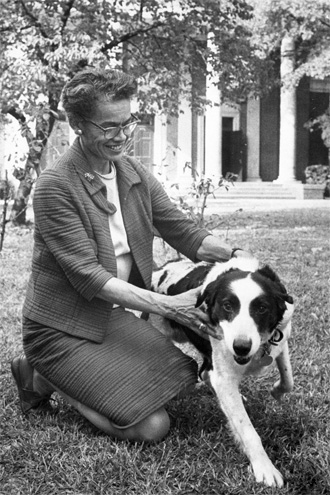Poet, priest, lawyer, inspirer – an inspiration to Martin Luther King, Jr., Ruth Bader Ginsburg and Thurgood Marshall, and a pen pal to Eleanor Roosevelt – and as of 2012, a saint in the Episcopal Church; today is the Reverend Dr. Pauli Murray’s feast day, and recognizes her contributions to civil rights, women’s rights, law and the Church.
She founded the Congress of Racial Equality (CORE)with Bayard Rustin in the early 1940s and influenced, among others, a young Martin Luther King, and the National Organization for Women (NOW) with Betty Friedan in the 1960s… later in life became the first Black woman to be ordained as an Episcopal priest…
Throughout her many lives, Murray wasn’t just on the forefront of history, she was constantly making it. “It may be that when historians look back on twentieth-century America,” historian Susan Ware once argued, “all roads will lead to Pauli Murray.”
Part of Murray’s powerful influence came from her living and working in all those lives and worlds:
“She’s a person that lived an intersectional life before the term even existed,” says David J. Johns, executive director of the National Black Justice Coalition.
She grew up in the south, and faced obstacles in both racism and sexism.
Her activism was large in part inspired by her maternal grandfather, Robert Fitzgerald, who fought for the North in the Civil War and taught Murray about the early abolitionists that fueled the movement long before the war began. After graduating from Hunter College in New York, Murray encountered the first major obstacle of her career.
In 1938, she was intent on attending graduate school at the University of North Carolina at Chapel Hill, but being Black prevented her from admission. “Under the resolutions of the Board of Trustees of the University of North Carolina, members of your race are not admitted to the University,” read the rejection letter from Dean W.W. Pierson. Unsatisfied, Murray wrote to the school’s president, Frank Porter Graham, and sent a copy of her application to NAACP leader Walter White. Inspired by her plight, he then passed the information along to the NAACP’s chief legal counsel, future Supreme Court Justice Thurgood Marshall.
Though the case earned national attention, Murray’s efforts did not earn her admission to the school. (It wasn’t until 1951 that the first Black student was accepted at UNC.) In 1940, she protested transit segregation in Virginia, and got herself arrested for refusing to sit on broken seats at the back of the bus—fifteen years before Rosa Parks.
She was later denied admissions to Harvard University because of her gender; however, before her death from pancreatic cancer, she donated all her papers to Harvard’s Schlesinger Library, including her writings on her own struggles with gender identity. After her death, her work continues to influence legal struggles even as recently as October 2019. From Forbes:
Almost 50 years later, Murray’s scholarship was debated before the Supreme Court again. When three employees were fired for being gay or transgender, the lawsuit against their employers was presented to the high court in October 2019. On June 15, six justices—including Chief Justice John Roberts—ruled in favor of the employees, effectively banning workplace discrimination due to sexual orientation or gender identity. The opinion, delivered by conservative Trump appointee Neil Gorsuch, hinged on the word “sex” in the 1964 Civil Rights Act that Pauli Murray had fought so hard to include.
“Because discrimination on the basis of homosexuality or transgender status requires an employer to intentionally treat individual employees differently because of their sex,” Gorsuch wrote in his majority opinion, this discrimination violates Title VII of the Civil Rights Act. Ruth Bader Ginsburg concurred.
Read more about the Reverend Murray’s life:
Brandeis University’s remembrance
“The Many Lives of Pauli Murray,” The New Yorker, April 17, 2017
The Episcopal Church encyclopedia
National Trust for Historic Preservation: The Pauli Murray House
Featured photo: From the Robert D. Farber Archives and Special Collections, Brandeis University
Earlier stories in the Episcopal Cafe:
Pauli Murray celebrated as Episcopal saint, July 19, 2012
Yale names new residential college for the Rev. Dr. Pauli Murray, April 29, 2016
Photo below:
By Carolina Digital Library and Archives – Carolina Digital Library and Archives. “Murray, Pauli, 1910-1985.” 5 July 2007. Online image. UNC University Library. CC BY-SA 3.0. Accessed 8 April 2011.


